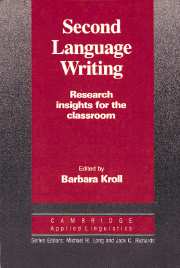Book contents
- Frontmatter
- Contents
- List of contributors
- Series editors' preface
- Preface
- Introduction
- I PHILOSOPHICAL UNDERPINNINGS OF SECOND LANGUAGE WRITING INSTRUCTION
- II CONSIDERATIONS FOR WRITING INSTRUCTION
- Chapter 7 Composing in English: effects of a first language on writing in English as a second language
- Chapter 8 The teaching of topical structure analysis as a revision strategy for ESL writers
- Chapter 9 What does time buy? ESL student performance on home versus class compositions
- Chapter 10 Feedback on compositions: teacher and student verbal reports
- Chapter 11 Teacher response to student writing: focus on form versus content
- Chapter 12 Responding to different topic types: a quantitative analysis from a contrastive rhetoric perspective
- Chapter 13 Writing with others' words: using background reading text in academic compositions
- Index
Chapter 11 - Teacher response to student writing: focus on form versus content
Published online by Cambridge University Press: 05 October 2012
- Frontmatter
- Contents
- List of contributors
- Series editors' preface
- Preface
- Introduction
- I PHILOSOPHICAL UNDERPINNINGS OF SECOND LANGUAGE WRITING INSTRUCTION
- II CONSIDERATIONS FOR WRITING INSTRUCTION
- Chapter 7 Composing in English: effects of a first language on writing in English as a second language
- Chapter 8 The teaching of topical structure analysis as a revision strategy for ESL writers
- Chapter 9 What does time buy? ESL student performance on home versus class compositions
- Chapter 10 Feedback on compositions: teacher and student verbal reports
- Chapter 11 Teacher response to student writing: focus on form versus content
- Chapter 12 Responding to different topic types: a quantitative analysis from a contrastive rhetoric perspective
- Chapter 13 Writing with others' words: using background reading text in academic compositions
- Index
Summary
While reading student papers, teachers often ask themselves, “How can I give the best feedback to help my students improve their compositions?” The question is difficult because there is little agreement among teachers or researchers about how teachers should respond to student writing. Much of the conflict over teacher response to written work has been whether teacher feedback should focus on form (e.g., grammar, mechanics) or on content (e.g., organization, amount of detail). Griffin (1982) has noted, “the major question confronting any theory of responding to student writing is where we should focus our attention” (p. 299).
Changes in both the focus of composition teaching and the focus of feedback have occurred over time. Early in the nineteenth century, rhetoric was taught, and little or no attention was paid to grammatical correctness (Connors 1985). Toward the end of the nineteenth century and into the twentieth, interest in grammatical correctness grew. Textbooks focused on exercises that required students to find and correct errors. In recent years, there has been emphasis placed on the writing process (see Krapels, this volume). Many process writing textbooks have been published which focus on content through several drafts of a paper and leave scrutiny of form to the final draft. However, many teachers maintain a strong interest in correctness in spite of this recent focus on process (Applebee 1981).
Should classroom teachers' written feedback focus on form or content? Does the research in composition support the current trends in composition teaching to focus on content?
- Type
- Chapter
- Information
- Second Language Writing (Cambridge Applied Linguistics)Research Insights for the Classroom, pp. 178 - 190Publisher: Cambridge University PressPrint publication year: 1990
- 118
- Cited by

